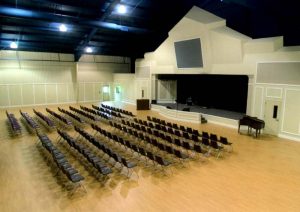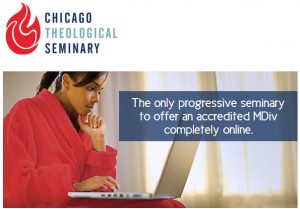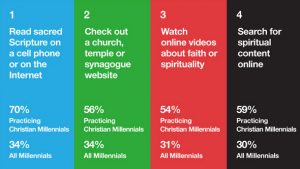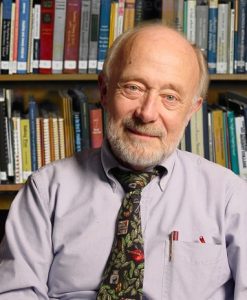Carol Pipes, editor of Facts and Trends, wrote a piece in that magazine's Fall 2013 edition on church building trends. She explored several significant trends, including designing for context, multi-use worship centers, larger gathering spaces, fewer classrooms, and remodeling existing facilities (p.24-26). So What? Perhaps the most important shift of all is with regard to how size will be viewed in the future. Pipes writes, "Small is the new big in the future." Read More …
Trends
A Progressive Seminary First (#1228)
Recently I wrote about the changes made by the Association of Theological Schools that allows seminaries to offer accredited Master of Divinity degrees comprised of coursework that can be completed 100% online. Chicago Theological Seminary is now marketing that they are "the only progressive seminary to offer an accredited MDiv completely online." So What? For the future of seminary education to change as a result of going online, such an education must be available for would be students Read More …
Common Pastoral Struggles (#1227)
Philip Wagner knows that "being a pastor is hard work." With this in mind, he recently wrote about the six most common struggles pastors face: criticism, rejection, betrayal, loneliness, weariness, and frustrations and disappointments. So What? Wagner encourages pastors to stay the course, reminding his readers that "persistence is powerful." The reality of these struggles also suggests that pastors should establish (and keep!) healthy boundaries, and Read More …
Technology, Millennials, and Faith (#1218)
Over the last 10 years, the Barna Group has interviewed 27,140 Millennials in 206 studies. Earlier this month, they released a few infographics displaying what their research finds with regards to how technology is impacting the faith of Millennials (also known as Gen Y - generally considered as those born in the 1980s through the early 200os). One of the newly released infographics shows how Millennials are integrating technology and faith. Just how widespread the integration Read More …
A Divided Christianity (#1216)
Marcus Borg is professor emeritus in the philosophy department at Oregon State University, where he was the Hundere Chair in Religion until his retirement in 2007. He is also the only author to ever make my top ten books of the year list in consecutive years (2011 and 2012). Recently, he joined Patheos. In his introductory post explaining who he is and what he will be blogging about, Borg explains the reality of what American Christianity is today: My (and our) Read More …
Things We Don’t Do Anymore Due to Technology (#1215)
Technology is transforming our lives. The following infographic offers a list of 50 things we don't do anymore because of technological advancements. Courtesy of: Mozy So What? Take a few minutes to review the list. How many of these 50 activities have you stopped doing at some point in the last ten years of your life? Are there any outdated activities your church continues to do that should be updated or replaced by something else because technology has created a new Read More …
Prayer Lists & Privacy (#1214)
For years, most congregations have created and distributed printed prayer lists. As technology has changed the way data is shared, many congregations have updated how they share these lists with interested parishioners. Jonathan Webster is a minister who coordinates chaplaincy and bioethics services for the Western Division of Carilion Clinic, and who serves as adjunct faculty at Jefferson College of Health Sciences and Radford University. He recently wrote about this topic for his Read More …
Income Statistics: A Reality Check (#1213)
I regularly hear people make assumptions about wealth and income. I encourage my readers to take a look at a powerful tool provided by the New York Times that allows you to input an annual household income figure then see how that amount ranks compared to those in one or more of 344 different zones or areas across the country. So What? I entered several figures and found both how that income level compares to others in the nation and in my local area. Here are a few Read More …
Counting Online Ministry (#1212)
As the year draws to a close, leaders in many congregations are actively involved in crafting annual reports. Depending on your congregation's denomination, network or association, certain statistics may be required. In almost all congregations, there are other things that get counted throughout the year and are then reported to the congregation annually. When people talk about the size and scope of ministry in a given congregation and seek to compare it to that of another, the Read More …
Church Website Reality Check (#1209)
Recently Adam McLane, a Partner at The Youth Cartel and Principal at McLane Creative, wrote about his experience visiting more than 1,000 church websites. Being completely frank, McLane notes that many sites suck and are "truly crappy." Since your congregation's website is a key way potential newcomers gather data and determine whether or not to participate, it should accurately reflect your congregation's identity. Not only should the site be aesthetically pleasing, but Read More …








